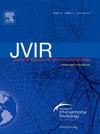股骨干动脉疾病侵入性治疗后的临床疗效:一项回顾性单中心队列研究。
IF 2.6
3区 医学
Q2 PERIPHERAL VASCULAR DISEASE
Journal of Vascular and Interventional Radiology
Pub Date : 2025-01-01
DOI:10.1016/j.jvir.2024.08.030
引用次数: 0
摘要
目的:确定股骨头坏死侵入性治疗临床成功的预测因素,以帮助临床决策:对2004年至2015年期间首次接受股骨头疾病侵入性治疗的676例连续患者进行了回顾性分析,这些患者接受了腔内治疗(EVT)或股骨头旁路术(FPB)。主要终点为主要和次要临床通畅率和截肢率。Kaplan-Meier曲线用于评估临床通畅率。Cox比例危险模型探讨了主要终点的预测因素:大多数患者(58%)接受了EVT作为主要干预措施,42%的患者接受了FPB。中位随访时间为 43 个月。主要临床通畅性丧失的唯一独立预测因素是危及肢体缺血(CLTI)(P=0.008,HR 1.25;95% CI 1.07-1.47)。继发性临床通畅与 FPB 手术(P=0.037,HR 0.66;95% CI 0.44 至 0.97)、介入前较高的踝肱指数(ABI)(P=0.029,HR 0.43;95% CI 0.20 至 0.92)、更多的远端径流血管(P=0.036,HR 0.77;95% CI 0.60 至 0.98)以及无缺血性心脏病(P=0.006,HR 1.69;95% CI 1.16 至 2.47)。在CLTI患者中,慢性肾功能衰竭预示着一级和二级临床通畅性的丧失以及截肢风险的增加:在该队列中,CLTI与股骨头疾病侵入性治疗的一次临床通畅率下降密切相关。继发性临床通畅与FPB、更高的ABI、更多的径流血管和无缺血性心脏病呈正相关。本文章由计算机程序翻译,如有差异,请以英文原文为准。

Clinical Outcomes following Invasive Treatment of Femoropopliteal Artery Disease: A Retrospective Single-Center Cohort Study
Purpose
To identify predictors of clinical success in invasive treatment for femoropopliteal arterial disease aiding clinical decision-making.
Materials and Methods
A retrospective analysis was performed on 676 consecutive patients who underwent a first episode of invasive treatment for femoropopliteal disease, either endovascular therapy (EVT) or femoropopliteal bypass (FPB), between 2004 and 2015. Primary end points were primary and secondary clinical patency and amputation rate. Kaplan–Meier curves were used to evaluate clinical patency. A Cox proportional hazard model explored predictors of primary end points.
Results
Most patients (58%) underwent EVT as primary intervention, while 42% underwent FPB. Median follow-up was 43 months. The only independent predictor for loss of primary clinical patency was critical limb-threatening ischemia (CLTI) (P = .008; hazard ratio [HR], 1.25; 95% CI, 1.07–1.47). Secondary clinical patency was positively associated with FPB surgery (P = .037; HR, 0.66; 95% CI, 0.44–0.97), a higher pre-interventional ankle–brachial index (P = .029; HR, 0.43; 95% CI, 0.20–0.92), more distal runoff vessels (P = .036; HR, 0.77; 95% CI, 0.60–0.98), and the absence of ischemic heart disease (P = .006; HR, 1.69; 95% CI, 1.16–2.47). In patients with CLTI, chronic renal failure predicted loss of primary and secondary clinical patency and increased amputation risk.
Conclusions
In this cohort, CLTI was independently associated with decreased primary clinical patency in invasive treatment for femoropopliteal disease. Secondary clinical patency was positively associated with FPB, higher ankle–brachial index, more runoff vessels, and the absence of ischemic heart disease.
求助全文
通过发布文献求助,成功后即可免费获取论文全文。
去求助
来源期刊
CiteScore
4.30
自引率
10.30%
发文量
942
审稿时长
90 days
期刊介绍:
JVIR, published continuously since 1990, is an international, monthly peer-reviewed interventional radiology journal. As the official journal of the Society of Interventional Radiology, JVIR is the peer-reviewed journal of choice for interventional radiologists, radiologists, cardiologists, vascular surgeons, neurosurgeons, and other clinicians who seek current and reliable information on every aspect of vascular and interventional radiology. Each issue of JVIR covers critical and cutting-edge medical minimally invasive, clinical, basic research, radiological, pathological, and socioeconomic issues of importance to the field.

 求助内容:
求助内容: 应助结果提醒方式:
应助结果提醒方式:


